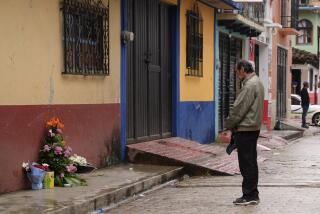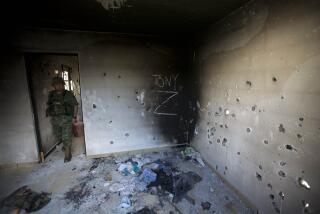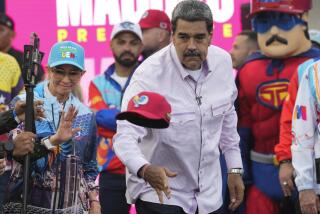Mexican street gang leader arrested in fatal shooting of U.S. official
Reporting from Mexico City — Mexican authorities said Friday that they have arrested the leader of a Ciudad Juarez street gang who ordered the fatal shooting attack on a U.S. consular worker in the border town in March.
Federal police said Jesus Ernesto Chavez told them that consular employee Lesley A. Enriquez, 35, was targeted because she was providing visas to rivals.
Police said Chavez, 41, also confessed to having taken part in a January shooting attack on a teen party that killed 15 people and raised an unusual outcry in Mexico over the runaway violence that has made Ciudad Juarez the deadliest city in the nation.
Chavez, whose nickname is “the Camel,” is a leader of a street gang known as the Aztecas, said Ramon Pequeno, who runs the anti-drug division of the federal police and announced the arrest. The Aztecas are allied with the Juarez cartel and has members on both sides of the U.S.-Mexico border.
Chavez said the cartel’s armed wing, known as La Linea, ordered Enriquez killed because she “was providing visas to members of the opposing group,” Pequeno told reporters. He did not elaborate.
U.S. officials in Mexico City said that Enriquez worked in the U.S. citizens services section of the consulate, which does not deal with visas. Enriquez, who was pregnant, and her husband, Arthur H. Redelfs, 34, were slain as they drive away from a birthday party in Ciudad Juarez on March 13. Both were U.S. citizens. The couple’s infant daughter was found crying but uninjured in the back seat.
The husband of a Mexican employee at the consulate was also fatally shot leaving the same party in a separate vehicle. The suspect said hit men also targeted the second car, which was the same color as that of Enriquez, because they weren’t sure which one she was traveling in, Pequeno said.
The Juarez slayings sparked worries that U.S. citizens or government employees had become targets of the violent drug-trafficking gangs that have waged war with Mexican authorities and each other in recent years.
The State Department at the time announced that diplomatic employees along the border in northern Mexico could move family members and dependents to the U.S. side.
The attack on the youth party in January was carried out by Aztecas who mistakenly believed members of a rival street gang were gathering, authorities said.
President Felipe Calderon came under intense criticism after he initially blamed the massacre on tit-for-tat gang rivalries. He backtracked after it turned out that the slain youths were promising students and athletes.
Chavez was previously imprisoned for five years in Louisiana on drug-dealing charges. In 2008, he was arrested by Mexican soldiers on drug charges, but freed, Pequeno said.
More to Read
Sign up for Essential California
The most important California stories and recommendations in your inbox every morning.
You may occasionally receive promotional content from the Los Angeles Times.









